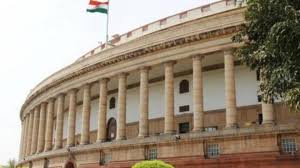New Delhi: A Member of Parliament cannot introduce more than three private member’s bills in a session and neither can move more than ten amendments to the ‘Motion of Thanks’ on the ‘Address by the President’ as the Speaker of Lok Sabha has amended the directions.
According to a release from the Lok Sabha, the Speaker has made two amendments to the Directions 27 and 42 in pursuance of Rule 389 of the Rules of Procedure and Conduct of Business in Lok Sabha.
The existing Direction 27 has been renumbered as Direction 27A and a new Direction numbered as 27 was added which states that a member shall be permitted to introduce not more than three private member’s bills during a session. In case, notices of the bills received from a member exceed three, the first three admissible notices shall be taken into consideration, unless the members mentioned their preference.
Similarly, the Speaker has also restricted the MPs from moving more than 10 amendments to the ‘Motion of Thanks’ on the ‘Address by the President’ or not more than 10 cut motions to a ‘demand for grant’. The existing Direction 42 has been renumbered as Direction 42A and the new Direction numbered as 42 limits the number of notices of amendments to ‘Motion of Thanks’ or of cut motions to 10.
“A member shall be permitted to move not more than ten amendments to the ‘Motion of Thank’s on the ‘Address by the President’ or not more than ten cut motions to a demand for grant. Where notices of amendments to the Motion of Thanks or of cut motions to a demand received from a member are in excess of ten, the first ten admissible amendments or cut motions, as the case may be, shall be taken into consideration, unless the member has indicated the preference,” states the new Direction.
While talking to Orissa POST, senior Biju Janata Dal (BJD) MP Bhartruhari Mahtab said that the Speaker shall also limit time allotted for the discussion on the private member’s bill to two hours.
“If you are restricting a member from introducing more than three bills in one session then you should also limit the time for discussion on one bill to two hours. But this is not happening. We have been discussing a bill on compulsory voting for almost six weeks. The Speaker should also limit the time for discussion on the private member’s bill to two or two-and-half hours. With this we can discuss on more bills in one session,” said Mahtab.
